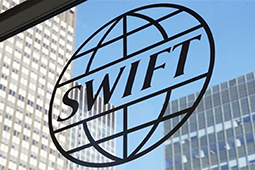
EU to Ask Russia, China to Join Alternative Payment Scheme for Iran

"The future transaction system will be open to an even broader set of parties after its initial launch," Chizhov said.
He reiterated that there is an understanding that they will create it on their own, put it into practice and then open it for third states, and said, "The project to create a special mechanism for financial transactions with Iran bypassing the US sanctions is now in full swing."
Chizhov reiterated that the EU's is prioritizes for maintaining financial trade with Iran.
The basis for the anticipated alternative financial system was formally set in a joint statement issued in September by the remaining signatories to the Iran nuclear deal, promising to establish a ‘special purpose vehicle’ to facilitate payments related to Iran’s exports as part of efforts to salvage the JCPOA after the US withdrawal and subsequent roll-back of sanctions.
European and Iranian politicians have called for European states to ensure continued dedication to the JCPOA by guaranteeing continued trade, withstanding US pressure.
On October 3, the International Court of Justice (ICJ), the UN’s top court issued a ruling reprimanding the US over its re-imposition of sanctions on Iran and ordering Washington to lift restrictive measures linked to humanitarian trade, food, medicine and civil aviation.
European Union Foreign Policy Chief Federica Mogherini said last month that a so-called Special Purpose Vehicle (SPV) would facilitate trade with Iran and it would go into force before November.
The SPV aims to keep trade flowing even if possible US sanctions hit Tehran.
European diplomats have previously described the SPV proposal as a means to create a barter system, similar to one used by the Soviet Union during the Cold War, to exchange Iranian oil for European goods without money changing hands.


Trump weighs using $2 billion in CHIPS Act funding for critical minerals

Codelco cuts 2025 copper forecast after El Teniente mine collapse

Electra converts debt, launches $30M raise to jumpstart stalled cobalt refinery

Barrick’s Reko Diq in line for $410M ADB backing

Abcourt readies Sleeping Giant mill to pour first gold since 2014

Nevada army depot to serve as base for first US strategic minerals stockpile

SQM boosts lithium supply plans as prices flick higher

Viridis unveils 200Mt initial reserve for Brazil rare earth project

Tailings could meet much of US critical mineral demand – study

Kyrgyzstan kicks off underground gold mining at Kumtor

Kyrgyzstan kicks off underground gold mining at Kumtor

KoBold Metals granted lithium exploration rights in Congo

Freeport Indonesia to wrap up Gresik plant repairs by early September

Energy Fuels soars on Vulcan Elements partnership

Northern Dynasty sticks to proposal in battle to lift Pebble mine veto

Giustra-backed mining firm teams up with informal miners in Colombia

Critical Metals signs agreement to supply rare earth to US government-funded facility

China extends rare earth controls to imported material

Galan Lithium proceeds with $13M financing for Argentina project

Kyrgyzstan kicks off underground gold mining at Kumtor

Freeport Indonesia to wrap up Gresik plant repairs by early September

Energy Fuels soars on Vulcan Elements partnership

Northern Dynasty sticks to proposal in battle to lift Pebble mine veto

Giustra-backed mining firm teams up with informal miners in Colombia

Critical Metals signs agreement to supply rare earth to US government-funded facility

China extends rare earth controls to imported material

Galan Lithium proceeds with $13M financing for Argentina project

Silver price touches $39 as market weighs rate cut outlook

















